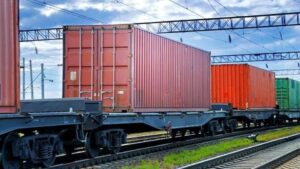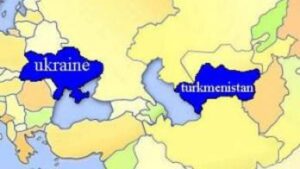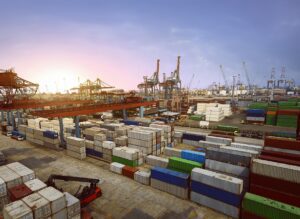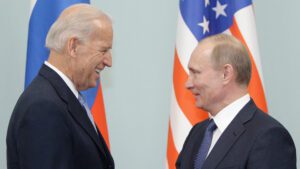
A China-Europe freight train carrying household goods is heading from Guangzhou, China, to Odessa, Ukraine’s Ministry of Infrastructure said on its Facebook page on Friday.
“Aa total of 50 containers with a volume of 40 feet each left the territory of Mongolia, 5,330 km are left to the border with Ukraine… This route combines the delivery of goods by sea and rail, as it combines two ports – Chinese Gaunzhou and Ukrainian Odessa. The distance between destinations is 8,408 km,” – the message says.
The ministry said that in Mongolia, the train was reloaded at the railway docking port of Erenhot. More than 6,000 freight trains from China to Europe pass through this hub.
The Ministry of Infrastructure recalled that the first train from the Chinese port of Guangzhou to Europe left for Poland at the end of April this year.
In 15 days, it arrived at its destination almost twice as fast as by sea.

Minister of Foreign Affairs of Ukraine Dmytro Kuleba and Deputy Chairman of the Cabinet of Ministers, Minister of Foreign Affairs of Turkmenistan Rashid Meredov held a telephone conversation, during which they agreed to establish a Business Council uniting the businesses of the two countries, the Ministry of Foreign Affairs of Ukraine said.
“Today, it is the ministries of foreign affairs of the two countries that are the driving force of bilateral relations between Ukraine and Turkmenistan. Together we are reaching a qualitatively new level of interaction,” the Ukrainian MFA press service said, citing Kuleba on Friday.
Kuleba confirmed the interest of the Ukrainian side in the participation of leading Ukrainian companies in the implementation of major business projects in Turkmenistan. In turn, Meredov said the Turkmen side sees Ukrainian companies as reliable partners and is interested in expanding cooperation.
“The heads of Ukrainian and Turkmen diplomacy agreed to create a Business Council, which will unite Ukrainian and Turkmen businesses on a permanent basis,” the Foreign Ministry said.
The head of the Ukrainian MFA proposed expanding bilateral cooperation to new sectors, in particular, medical tourism and agriculture.
Kuleba also noted the importance of restoring direct flights between Ashgabat and Kyiv and Ashgabat and Lviv for the revitalization of interpersonal and business contacts.
“Inter-human ties best strengthen relations between our societies and states,” he said.
The ministers discussed preparations for the fifth meeting of the Joint Intergovernmental Ukrainian-Turkmen Commission on Economic, Cultural and Humanitarian Cooperation in Kyiv.
The sides paid special attention to the issues of mutual support of initiatives within international organizations, as well as interaction in the education and culture sectors.
Meredov highly appreciated the extremely friendly attitude of Ukraine towards Turkmen students studying in Ukraine. Kuleba said he would cordially welcome the increase in the number of students from Turkmenistan in Ukrainian educational institutions.
A separate subject of conversation was the prospects for the development of new logistics routes between Central Europe and Central Asia, in which Ukraine and Turkmenistan can play a key role.

The U.S. Department of Defense (DOD) has approved $150 million in assistance to Ukraine to strengthen its defense capabilities, including training and advisory efforts, according to the U.S. Embassy in Ukraine.
“New $150 million package for Ukraine Security Assistance Initiative, including training, equipment and advisory efforts to help Ukraine’s forces preserve the country’s territorial integrity, secure its borders, and improve NATO interoperability,” the embassy said on Twitter.
President of Ukraine Volodymyr Zelensky thanked the U.S. side for the decision.
“Grateful to the White House for this important contribution to saving lives of our soldiers and strengthening capabilities of the Ukrainian army,” the president said on Twitter.

Ukrainian Foreign Minister Dmytro Kuleba during his phone call with Indonesian Foreign Minister Retno Marsudi discussed steps to step up bilateral trade, the press service of the Ukrainian Foreign Ministry has reported.
“We are interested in significantly expanding the range of Ukrainian exports to the Indonesian market, which we also consider as a platform for the expansion of Ukrainian goods to other countries of Southeast Asia. Ukraine can also become a bridge for Indonesian goods to enter the markets of Eastern Europe,” Kuleba said.
He noted the importance of holding the fourth joint meeting of the intergovernmental economic commission in 2021 to select promising economic projects. The minister also said that the Council of Exporters and Investors under the Ministry of Foreign Affairs of Ukraine will bolster assistance to Ukrainian companies in establishing ties with Indonesian business.
The two foreign ministers pointed out the importance of starting expert consultations between Ukraine and Indonesia to consider the signing of an agreement on preferential trade.
Kuleba also called a promising area of cooperation in teaching Indonesian students in Ukraine.
“The COVID-19 pandemic has partially slowed down the development of important projects between our states. There has been a slight drop in trade volumes, contacts between governments and citizens have become fewer. We are now striving not only to catch up with the pre-existing level of relations, but also to significantly revive them in the political, trade, educational and cultural spheres,” the minister of foreign affairs of Ukraine said.
The phone call between the Ukrainian and Indonesian diplomats took place on the day of the celebration of the 29th anniversary of the establishment of diplomatic relations between Ukraine and Indonesia.
The ministers agreed to hold political consultations of their ministries in the near future and presented invitations to exchange visits.

A meeting between U.S. President Joseph Biden and Russian President Vladimir Putin, scheduled for June 16 in Geneva, will be devoted to developing rules for their confrontation that are manageable and predictable for both sides, both in Ukraine and on a number of other international issues, political scientist believes, Director of the Institute of Global Strategies Vadym Karasiov said.
“The point of the Biden-Putin meeting will be to develop rules for the confrontation between the United States and Russia so that this confrontation is manageable. This also applies to Ukraine, judging by Putin’s recent interview. It should be understood that Ukraine remains for a long time a territory where the interests of the United States and Russia will come into contact. It is important for Biden and Putin to understand the limits of this influence and to make the overlapping of their interests more predictable and manageable and not turn into direct or even military clashes,” “Karasiov told Interfax-Ukraine.
According to him, it will also be important for the Russian President to hear from the U.S. President about his plans to provide Ukraine with the NATO Membership Action Plan (MAP).
According to political scientist, Director of the Ukrainian Barometer sociological service Viktor Nebozhenko, “one should not expect sensations from the meeting between Biden and Putin, although the background itself and the upcoming negotiations will be quite sharp.”
“There are exaggerated expectations against an overly aggressive background. Biden fears the Republican party, which, criticizing him, is gaining strength. In turn, Putin fears losing control over gas transit, as once happened with Gorbachev [Soviet President Mykhail Gorbachev]. As a result of their meeting, there will be no easy decisions on certain issues. There will be an intricate text of the communique, a general press conference, but we will not get something that would give us the opportunity to draw quick conclusions,” Nebozhenko said.
According to the political scientist, “sensations should be expected by the autumn.” “After Putin and Biden, other players will come to the fore, namely, China, the EU countries, even Ukraine, each with its own political party.”
According to expert of Hardarika Strategic Consulting Corporation Kostiantyn Matviyenko, in the conversation between the presidents of Russia and the United States around Ukraine, the key issue will be the Nord Stream 2 gas pipeline on the bottom of the Baltic Sea.
“They will try to find such a mechanism so that Russia does not ‘lose face’ in the gas pipeline construction, and the United States can show that they ensure the security of Ukraine,” he told the agency.
Matviyenko said the leaders of Russia and the United States will focus, in addition to Ukraine, on the issue of resuming the nuclear deal with Iran, the Russian initiative to ease sanctions, “since they are” hitting “its technical capabilities in the military sector,” as well as Russia’s access to world food markets and seeking informal quota arrangements.
According to PhD in Political Science, political scientist Ihor Petrenko, the talks between the presidents of the United States and Russia “will most likely focus on environmental issues, since it is in this that they can reach consensus and progress.”
“If you recall, Putin devoted a significant part of his address to the Federal Assembly in April to ecology. It was a kind of pass towards Biden. And ecology is one of the electoral promises of the U.S. leader, important for his political agenda,” he told Interfax-Ukraine.

The mobile operator lifecell in May launched 4G mobile communications in 343 settlements in all regions of Ukraine.
According to the operator’s statement, in general, as of the end of May, 10,911 settlements were connected to the lifecell 4G network, where a total of more than 27.9 million people live.
In May, the lifecell network was expanded in 343 settlements, where 196,000 Ukrainians live. Of these, 339 with a population of up to 5,000 people, and four with up to 25,000 people.
“With the deployment of the network, the consumption of data traffic has also grown. Thus, lifecell subscribers who use 4G consumed 81% more mobile Internet traffic in May, compared to the same period in 2020,” the operator said.
As of the end of May 2021, the leaders in the use of lifecell mobile Internet were:
– up to 5,000 people – Baturyn (Chernihiv region);
– up to 25,000 people – Zdolbuniv (Rivne region);
– up to 50,000 people – Fastiv (Kyiv region);
– up to 100,000 people – Uman (Cherkasy region);
– up to 500,000 people – Vinnytsia;
– up to 1 million people – Zaporizhia.
In the category of cities with a population of more than 1 million people, the first place is occupied by Kyiv, followed by Odesa and Kharkiv.